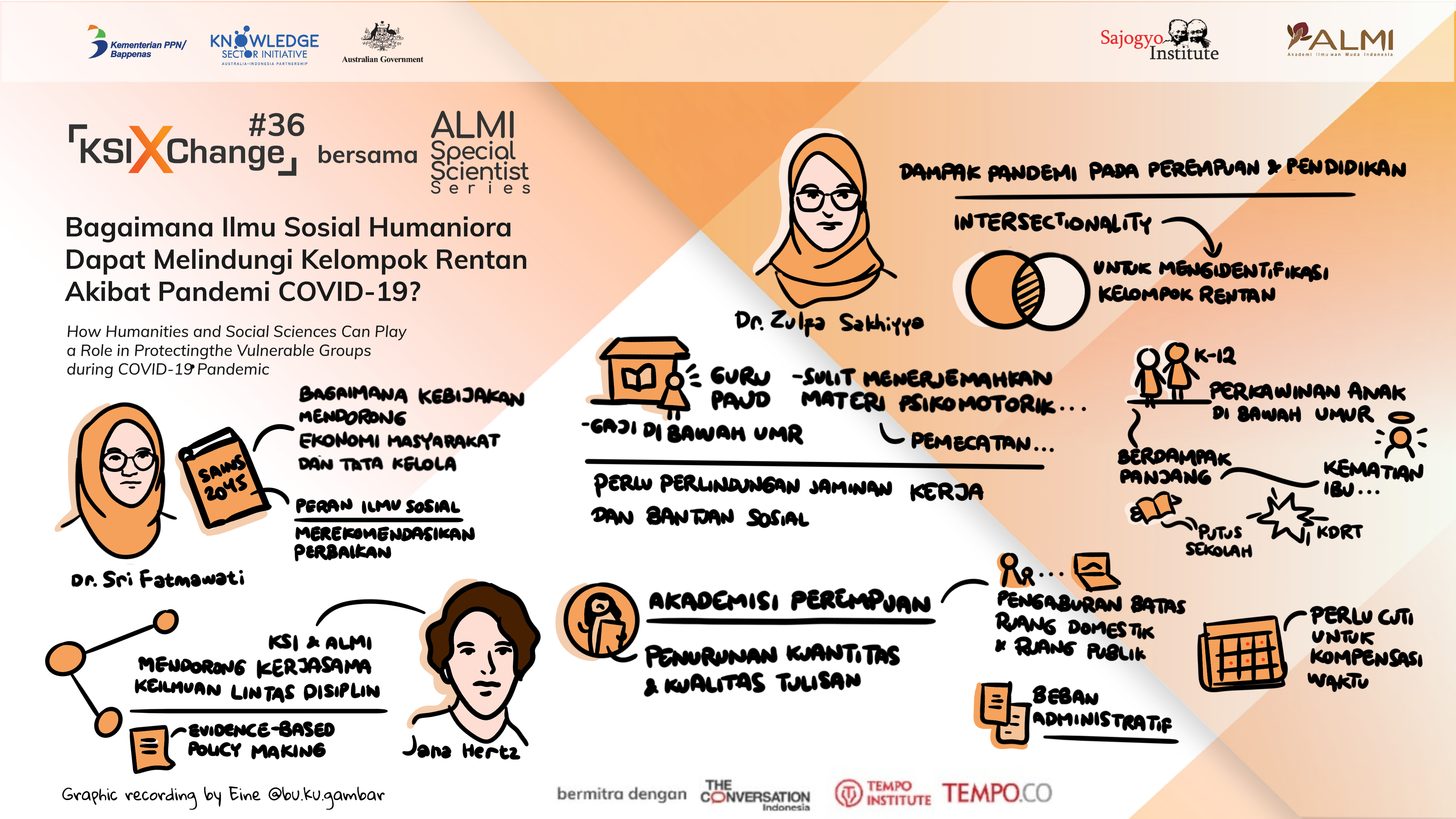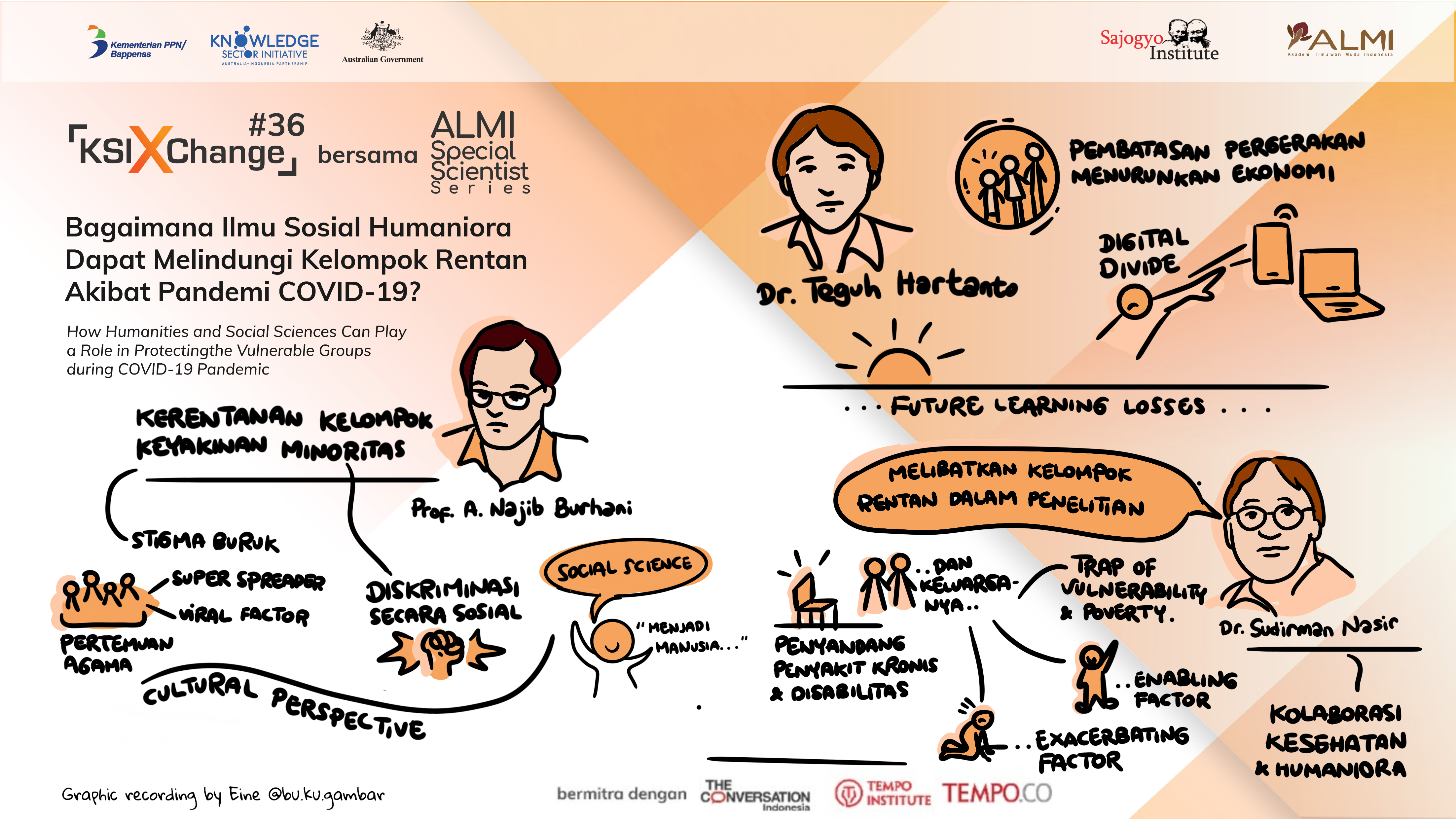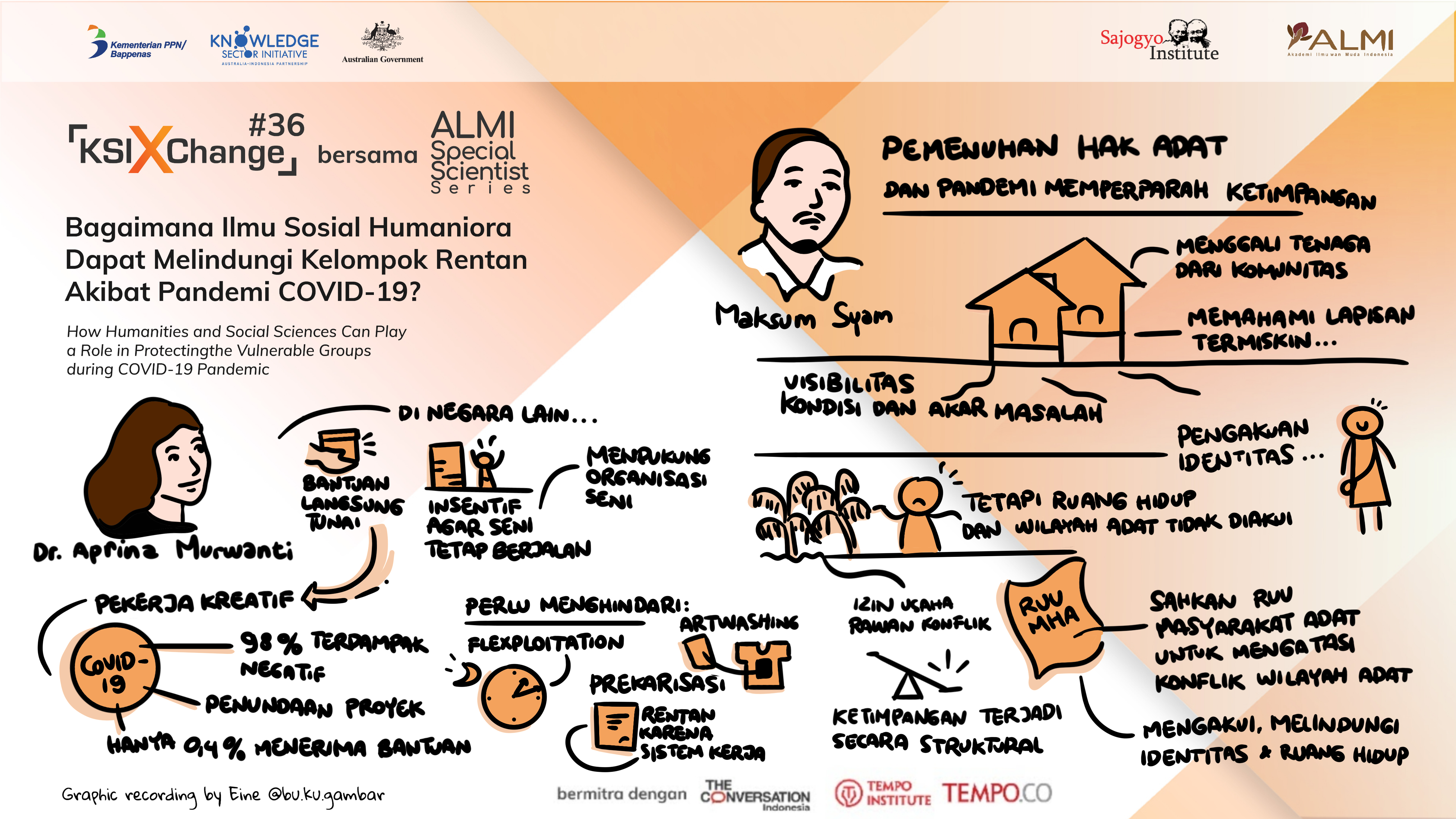Vulnerable groups’ rights and needs are often neglected in the policy formulation process, and the COVID-19 pandemic has exacerbated this situation. Perspectives from social and humanities science, which can provide analysis of the situation faced by vulnerable groups is crucial to promoting appropriately targeted policies.
This was one of the points in a discussion themed, ‘How Social and Humanities Science Can Protect Vulnerable Groups from the Impact of the COVID-19 Pandemic’, in the KSIxChange#36: ALMI Special Scientist Series event on Tuesday 21 September. The event, held by the Knowledge Sector Initiative (KSI) in collaboration with the Indonesian Young Academy of Science (ALMI), brought together speakers who presented the situation of vulnerable groups in Indonesia. They included an education researcher from Semarang State University (Universitas Negeri Semarang), Zulfa Sakhiya, an art and culture researcher from Jakarta State University (Universitas Negeri Jakarta), Aprina Murwanti, the Executive Director of Sajogyo Institute, Maksum Syam, a social, culture and religion researcher from the National Research and Innovation Agency (BRIN), Najib Burhani, an economic researcher from the University of Indonesia, Teguh Dartanto, and a health researcher from Hasannudin University, Sudirman Nasir. Inaya Rakhmani and Evi Eliyanah from ALMI moderated the discussion. This event was broadcast on The Conversation Indonesia’s YouTube channel and was equipped with English and Bahasa Indonesia interpreters, as well as sign language interpreters.
The KSI Team Leader, Jana Hertz, explained that KSI and ALMI had been working together for several years to promote research and knowledge for public policy. This discussion was expected to promote the implementation of social humanities science perspectives on handling the pandemic, and making voices of vulnerable groups more seriously heard, thereby raising them in the policymaking process. The head of ALMI, Sri Fatmawati, said the pandemic had resulted in different impacts, especially for vulnerable groups. These groups are often forgotten in both service delivery and policy. This is where social science is significant in examining different aspects and approaches that policymakers could use, and providing answers to reduce various social disparities.

A similar outlook was conveyed by another speaker, Dr. Teguh Dartanto, an economic researcher at the University of Indonesia. According to Dr. Dartanto, policymaking often only looks at the economic stand point, while the social humanities approach has an important role in mapping vulnerable groups that have not received assistance, targeting them more accurately. This also helps the government to design inclusive and adaptive social protection policies to respond to change.
Dr. Aprina Murwanti, an art and culture researcher at Universitas Negeri Jakarta, gave her views on creative workers. While they are included in the vulnerable groups, they may not have been receiving appropriate support or assistance during the pandemic.
Inter-Disciplinary Collaboration
Najib Burhani from BRIN said a wide perspective was need to understand the COVID-19 pandemic. In this context, the social and humanities science approach was useful to ensure that in handling COVID, people were still being treated as humans who had relationships with their families and communities. Najib Burhani said social and cultural strengths, such as philanthropy, volunteerism, working together and empathy, were essential social capital both in mitigating and handling the pandemic’s impacts.
Najib Burhani said one of the factors needing examination was religion, which was often considered the enemy of science. A number of religious gatherings have been cited as events that spread the virus. Minority religious groups also needed to be observed. Discrimination they experienced before the pandemic has continued during the pandemic, making them more vulnerable to social and economic pressures. However, according to Najib Burhani, it is important to note that many religious minority groups have been very active in mitigating the pandemic. Religion affects behaviour, thus needs to be considered when handling the pandemic. “Good communication by considering culture and religion, including minority groups, will support efforts to manage COVID,” he said.

Sudirman Nasir from the Hasannudin University added that health issues were too complicated to only be handled from a health perspective. The tradition of combining medical science with other disciplines has actually been used for some time. With inter-disciplinary collaboration, health issues can be handled well, as it considers many factors, including the fact that disease risk and vulnerability are not the same. Some groups are more vulnerable and some are stronger due to their privileges, thus requiring different approaches to handle them. One of the vulnerable groups in the pandemic is people with chronic illness, whose access to treatment is hindered due to limited health facilities and economic pressures. They therefore need to be considered in the pandemic handling policy.
Women and Indigenous Communities
Another vulnerable group during the pandemic is women. Zulfa Sakhiya from Universitas Negeri Semarang, who researched the impact of the pandemic on women in the education field, explained that COVID-19 confirmed that disparities have existed for a long time. Women working in the education field, starting from early education to higher education are facing their own problems. During the pandemic, these problems have multiplied to add to their vulnerability, from job termination, volunteer work or being paid below standard, to blurred lines between career and domestic work. Another note was the increase in child marriage. Citing data from the National Commission on Violence against Women, the number of child marriages during the pandemic rose by 300 percent. This revealed a higher number of school dropouts during the pandemic, particularly at the junior high and senior high school levels. One of the reasons was that children had to help their family’s economy, which had suffered as a result of the pandemic. “There is a need for cross-sectoral cooperation to produce relevant social interventions for identified vulnerable groups in the education field,” Zulfa Sakhiya said.

Indigenous communities are another group whose vulnerability increased during the pandemic. Maksum Syam from Sajogyo Institute said there were many indigenous areas that had not been recognised by the state, thus creating conflict between indigenous communities and the state or private sector, especially in the natural resources and agrarian sectors. This was a result of land conversions to plantations and mines, and infrastructure development. During the pandemic, this situation continued, with agrarian conflicts involving indigenous communities continuing to rise. From the policy perspective, the state issued a controversial regulation, the Job Creation Law, while the Bill on Indigenous Community remained unratified.
Maksum Syam said indigenous communities had their own strengths in facing the impacts of the pandemic. They had a strong social capital, thus ensuring the supply of staple food, and they had their own systems to preserve descendants, spreading knowledge and entertainment. But this social capital could only be optimised when there was no outside interference. Therefore, the Bill on Indigenous Community needs to be ratified. “Various policies are not on their side, eliminating their resilience and making them vulnerable to face the pandemic,” he said.
This discussion intended to emphasise the important role of social humanities science, and to provide a better understanding of the needs of vulnerable groups, to prevent them from being marginalised further. The COVID-19 pandemic has become a multi-dimensional crisis that needs responses from various parties, with collaborations between multi-disciplined sciences using inclusive and pro-vulnerable group approaches. The uniformity of scientific approaches has weakened solutions that can be offered to the public, therefore it is important for social humanities research to be integrated into the policymaking process. Support from policymakers is needed to foster this action and research behaviour, so that social humanities researchers become more able and empowered to provide policy inputs for social disparity eradication during the COVID-19 pandemic. A multi-disciplined and inclusive approach to the knowledge-to-policy integration process would also offer vulnerable groups agency. It would enable them to position themselves as sources of knowledge for policy issues they face, and as active advocates for social justice.





